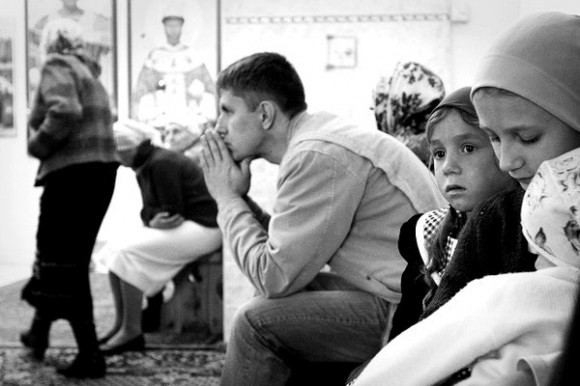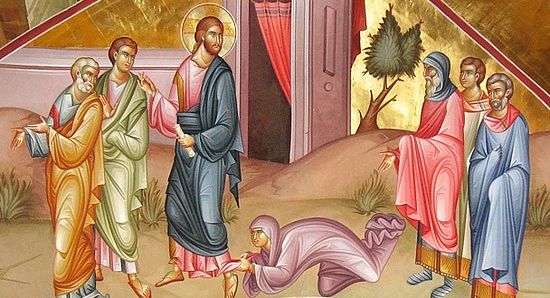Some good things are a long time coming. We know that in our own lives, relationships, and accomplishments at work, school, or elsewhere. The best things in life are worth waiting for and require our patience and preparation.
That is true of how salvation has come to the world through our Lord, God, and Savior Jesus Christ. The many generations of the Hebrew people in the Old Testament prepared His way. God’s messengers, the angels, instructed them through the Law and other announcements and actions. His prophets called the people to faithfulness in anticipation of the Messiah, the One anointed for the fulfillment of all the promises to Abraham both for his descendants and all the people of the world who respond with faith to the Lord.
Today we are one week away from the beginning of our time of preparation for the coming of the Messiah, for the birth of Jesus Christ. Neither merely an angel nor a prophet, He is truly God in the flesh. The Nativity Fast, which we often call “Advent,” begins on November 15, forty days before the great feast of Christmas (Ed. note: Orthodox churches that use the Old Julian calendar begin the Nativity Fast on Nov. 28) The weeks leading to the Nativity of the Savior do not have the bright sadness of Lent, as they are a joyful time of getting ready to celebrate Christ’s birth by receiving Him anew into our lives as we take our place with angels, shepherds, prophets, and generations of righteous people from all over the world who have rejoiced that the Son of God has become one of us, bringing broken and suffering human beings into the very life of God, Who made us in His image and likeness.
We will fast, pray, confess our sins, give to the needy, and forgive our enemies during the coming weeks so that we will have the spiritual strength to celebrate Christmas properly, which means welcoming the Savior into our lives at His birth. Of course, anyone can make a cultural observance of Christmas. But something as profound as the Incarnation, the joining of divinity and humanity in the Person of Jesus Christ for our salvation, requires more than putting up a tree or going to a party. It requires that we unite ourselves personally with the One Who comes to save us, that we prepare the way of the Lord in our own souls. That is what the Nativity Fast is all about as a season of joyful anticipation, a time of getting ready to enter more fully into the salvation of the world.
As we all know, the world in which Christ was born was not a place of perfection where all was sweetness and light. Some sought to kill Him from His birth, and St. Joseph had to lead the infant Jesus and the Theotokos to Egypt for their physical safety. Christ was born as a vulnerable baby in the same world of suffering and pain that we know all too well. It is the world experienced by Jairus in his grief and by the woman with the flow of blood in her chronic illness. It is the same world filled with war, terrorism, hatred, strained marriages, broken homes, and every sort of depravity, decay, and loss. And in a season when our culture tells us to shop, eat, drink, be merry, and pretend that all is well, many will experience these pains even more powerfully than usual. We will soon be in what many people find to be the most stressful and difficult time of year.
There is, of course, no magic solution to the problems of the world or our own personal struggles. But the weeks of Advent lead us back to today’s epistle reading: “As it is, we do not yet see everything in subjection to Him. But we see Jesus, Who for a little while was made lower than the angels, crowned with glory and honor because of the suffering of death, so that by the grace of God He might taste death for everyone. For it was fitting that He, for whom and by whom all things exist, in bringing many sons to glory, should make the Pioneer of their salvation perfect through suffering.” (Hebrews 2:2-10)
The Savior entered fully into the corruption and danger of our world, voluntarily suffering so that our path of struggle would not be in vain, but become a blessed entrance to eternal life. His unimaginably profound love is manifested through the humility of His birth, life, and death—through which He conquered all the corruption and pain of our fallen humanity in His glorious resurrection. That is how He brings us into His glory when we endure suffering faithfully and obediently. That is how we participate in His glory as we share in His life, which requires dying to sin, taking up our crosses, and serving Him in our neighbors, especially “the least of these.”
Who in the Church would not praise this way of living? Talk, however, remains cheap; truly to prepare our hearts and souls to receive Him at Christmas requires much more than pious words and warm feelings. It requires actions that grow from a courageous mind and a humble heart. The woman with the flow of blood certainly had the courage to confess openly that she had touched the hem of Christ’s garment and found healing for her illness, which had made her unclean and isolated for many years. She fell down before Him trembling and said out loud what she had done and revealed the deep pain and embarrassment of her life. The Lord said that her faith had made her well and then she left in peace. Courage is not the absence of fear, but doing the right thing in spite of our fears. And sometimes the greatest courage is shown not by superheroes, but by perfectly ordinary people who simply reach out to God for mercy and healing as best they can one day at a time (Luke 8:41-56).
We must be courageous in refusing to be overcome by the fears and doubts that may fill our minds this Advent. Perhaps difficult circumstances of whatever kind seem more real to us than the new life of Christ. Maybe we despair of ever finding health for our bodies, healing of broken relations with others, the strength to reorient our lives toward God, or hope for a world with so many problems. When done with humility, the spiritual disciplines of the Nativity Fast help us to remain focused on our Savior, Who entered into more suffering and pain than we can possibly imagine for our salvation. Because of Him, even our most difficult struggles may become pathways to share more fully in His victory over all evil and corruption. He was born to sanctify every aspect of human existence. No dimension of our life in the world is a stranger to Him or His salvation. We must have the courage not to despair because He is born truly to save and bless us in our much less than perfect world.
In addition to courage, we also need humility as we begin to prepare for Christmas. Did you notice the humility of Jairus in today’s gospel reading? (Luke 8:41-56) This upstanding leader of the Jewish community humbled Himself by falling before the Lord and asking for His help in healing his daughter. And even when all was lost and others were laughing at Christ, Jairus and his wife had humble faith and were amazed at the miracle.
The spiritual disciplines of the Nativity Fast are tools to help us grow in the humility that we need in order to be amazed at the birth of our Lord in a world that often laughs at those who view Christmas as anything other than a mere cultural celebration or a season of shopping and socializing. Fasting from the richest and most satisfying foods is a way of humbling ourselves before God, gaining some strength in resisting self-centered desires, and freeing up resources to share with the needy in whom He is present to us. Confessing our sins is at the heart of humble repentance, of acknowledging how we have fallen short and receiving the strength to heal from our self-inflicted wounds. What could be more fundamental to true humility than taking the time each day to call to Him from the depths of our souls? That is the discipline of prayer. And there is surely no greater opportunity for humility than forgiving our enemies and asking forgiveness of those whom we have wronged.
For many of us, life will soon get very busy all the way to New Year’s and Theophany. Now, in this week before Advent begins, is the time to prepare to cultivate the courage and humility that we need to celebrate the birth of Jesus Christ by welcoming Him anew into our lives. Now is the time to get ready to enter more fully into His life, for He is the salvation of the world.





















